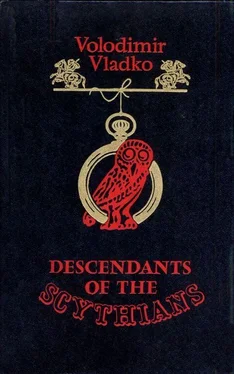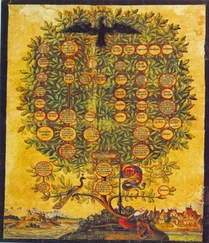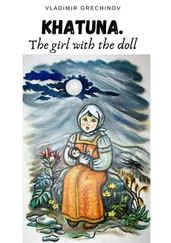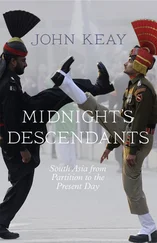Ronis and Varkan were taking their time to make thorough preparations for the uprising. Artem considered it to be the best way of doing things, but still, he was burning with desire to throw himself immediately into the fray which would bring freedom to Lida and Ivan Semenovich.
Meanwhile, all he could do was to watch the Scythians from some distance away. Only when they stopped for the night, did Artem and Varkan risk coming any closer. Artem still entertained a dim hope that some happy chance would present itself for saving Lida and Ivan Semenovich. But, alas, nothing of the sort occurred, as Artem never managed to get even anywhere close to the center of the camp where the big wagon that was the focus of his attention, stood.
Artem could easily tell this wagon from the rest by its red covering which he had glimpsed occasionally in the daytime. Once he even thought he could see Lida peering out, but he was too far away to know for sure. Anyway it was quite out of the question to attempt to set Lida free. There was nothing for him to do but clench his fists and wait.
The tension of forced inactivity was somewhat alleviated by Lida’s letters. It was not Diana that carried the messages now. Ronis had set up a delivery service: every night, slaves brought Artem little sheets of paper torn from the geologist’s notepad covered with Lida’s fine handwriting, bearing signs of haste. Artem read and reread the messages several times, trying to grasp Lida’s thoughts and feelings. Then, in his mind’s eye, he would conjure up the image of his dear Lida:
…The wagon, heaving and creaking, its wheels going over bumps and small hollows, the tracks left on the ground being the only road across the wide steppe with the pink- yellowish forest stretching endlessly on one side, and the cliffs looming behind. Then a flat stretch of ground without bumps or hollows, the only sound now — the loud unceasing rasping of the wheels on the axles coming from all sides…
…Lida sitting in the wagon, looking out, staring at the distant woods, knowing that there Artem, Dmitro Borisovich, Varkan and his men, were following and waiting for the proper moment to get them free! Lida staring and sighing, the poor girl! Seeing nothing but the motionless trees, Lida would turn away, bending low over a piece of paper, writing the letter Artem was holding in his hand…
My Dearest Artem, In your letter you tell me not to worry, to be cool and composed. I know it without your having to remind me, but waiting is so depressing! Waiting all day long and waiting all night long, waiting for something that doesn’t happen! The only thing that makes the waiting easier is writing letters to you. So I write as much as I can and will write as long as there are sheets left in Ivan Semenovich’s pad. You want me to describe everything that has happened to us since the departure. All right, I’ll do it.
From the very start, the wagon we’re riding in has been in the center close to Hartak’s and right next to Skolot’s huge funeral bier with its red cover; ten white horses are pulling it. There are red stripes along the horses’ sides and backs. The priests escorting the body, are riding white horses too…
Artem again concentrated on the images evoked in his mind; he had in fact seen some of what Lida described from the hiding place — it was an impressive sight…
…The large bier with the body of Skolot, priests with sacred images of eagles, panthers and deer, the highest nobles and elders heading the procession. Around the bier those Scythians who had inflicted ritual wounds on themselves to express their grief at the death of the great chieftain Skolot: parts of ears missing, streaks of blood drying on their cheeks, necks and clothes; cuts on their hands and arms still oozing blood; foreheads and noses with deep scratches; left palms pierced with arrows, and hair cut short. The Scythians singing a disturbing, heart-rending song, with the priests leading — or perhaps not a song but chanting a prayer to the implacable gods? None of the Scythians was aware of the real cause of Skolot’s death. Dorbatay, the poisoner, was riding in his wagon, looking very dignified, feigning concentration as he was mumbling prayers to the gods. The white horses slowly pulled the bier; another big wagon, carrying Skolot’s bereaved wife, moved right behind the bier; she kept her face buried in her wrinkled hands, covered with age-spots. Two old priests were sitting beside the widow who was destined to follow the chieftain into the grave. The body of Skolot lay under a felt canopy in the red bier garbed in sumptuous clothes, the gold helmet on his head and massive gold bracelets on his wrists, arms folded on his chest; the old chieftain’s short sword resting by his side; Skolot’s expression peaceful, his closed eyes suggesting sleep rather than, death, his face showing no signs of the death throes that had filled his last moments, only the thin, transparent layer of wax over the face and hands reminding one that he was rather dead than quietly resting or slumbering…
The procession pushed on and on, always in near-perfect order, the self-assured Dorbatay in his scarlet cloak and helmet-like headgear preserving his solemn and dignified appearance.
The innumerable gold decorations sewn onto his cloak and headdress jungled every time the wagon he was riding in, heaved over bumps and holes. Dorbatay’s eyes were fixed on some invisible spot beyond the gray horizon; he seemed completely submerged in prayers for his beloved brother, the dead chieftain, not hearing or seeing anyone around. The simple-hearted Scythians, taken in by this performance, glanced at him with great respect.
Hartak also tried to preserve a solemn and dignified appearance, sitting straight on his horse, putting his hand on his hip in a carefree fashion, looking around, his eyes shifting, searching for a mocking glance, as he knew well that he did not command much respect with the warriors. In a short time, his head would bend under the weight of the big golden helmet. His hands nervously picked at the reins. Hartak looked very unsure of his equestrian abilities, and it was an effort for him to keep from tumbling off his horse.
“What a freak!” Lida could not help exclaiming as she caught sight of him.
Hartak must have heard her voice in spite of the considerable distance separating them. He looked back quickly, fixing his eyes on her. Lida froze in fear for a moment, but then she realized the freak could not have understood her anyway. In fact, Hartak smiled, evidently trying to make his smile a sweet one. It even seemed to Lida that Hartak had the impudence to wink at her! That was too much to bear, and she turned away quickly.
She dared to raise her eyes only after the bier had passed, followed by the rasping wagon in which the chieftain’s widow was riding. Only after Hartak’s wagons passed did the one carrying the captive strangers move on. Their wagon was followed by those with the slaves, servants and wives of the new chieftain.
Ivan Semenovich, taking a look around him, said:
“Do you see that big wagon over there, my dear girl? The one with the women in tall headdresses shooting glances at you. I’m sure, they’re Hartak’s wives, and they seem eager to have a look at the new bride who’s captured their husband’s heart…”
“Oh, you shouldn’t say that, Ivan Semenovich!” Lida said, much annoyed. “You know perfectly well how hateful the very thought of that is to me…”
But the geologist continued, unabashed:
“Believe me, Lida, I wish I didn’t have to mention it, but… I think it’s better to keep it in mind all the time so you’ll stay on the alert and not be taken unawares. I admit I drew your attention to that wagon on purpose to remind you… to behave properly. I want to caution you against irresponsible conduct.”
Читать дальше












